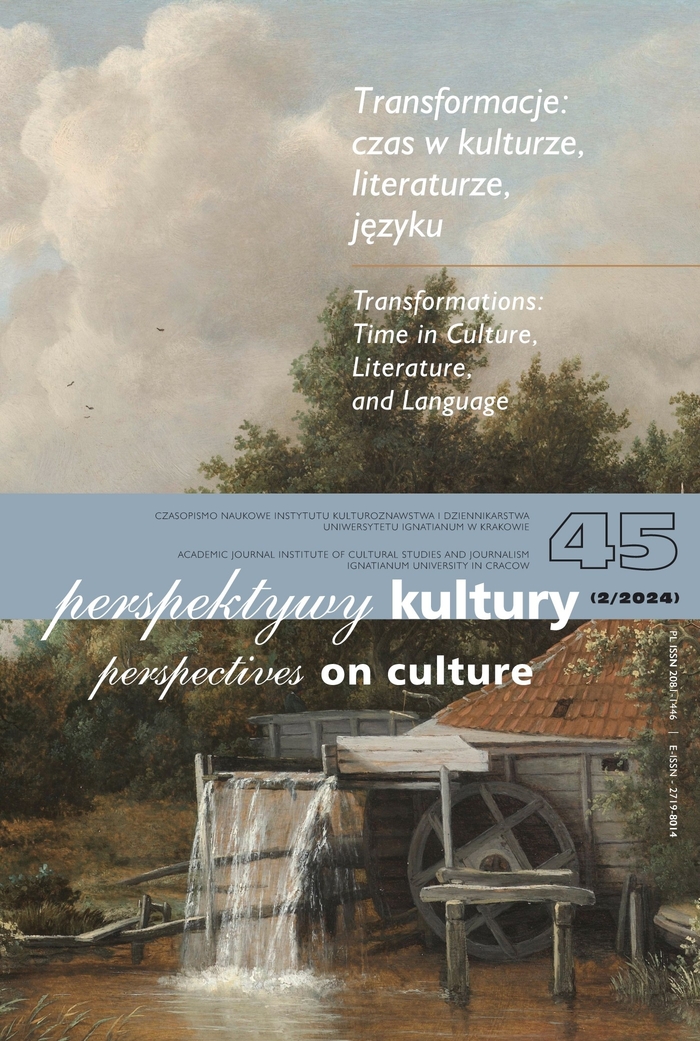Eternal Nature and Transient Man in Joseph Conrad’s The Mirror of the Sea and Ivan Turgenev’s A Sportsman’s Sketches
Abstract
Both Turgenev’s A Sportsman’s Sketches and Conrad’s The Mirror of the Sea demonstrate faithful observation and rendering of life and an unusual awareness of place. In a specific realistic and impressionistic manner they depict eternal nature – the forest and the sea – as a powerful force indifferent to transient man, as a mirror of life, human conscience and problems. Nature is complete and self-sufficient; the world seems to work perfectly well without man. Both the impenetrable, sombre forests and the vast solitude of waters become factors that affect or shape the destiny of Conrad’s and Turgenev’s heroes. Nature highlights the characters’ emotions and provides a sense of continuity of existence. In A Sportsman’s Sketches and The Mirror of the Sea man lives close to nature, even in union with it. Reflections upon nature lead to bewailing the transience of things and to similar communications of the theme of freedom. However, whereas in Turgenev’s Sketches, nature is a force capable to influence the character of man and determine his moral development, Conrad uses nature as a pretext for the expression of ethical values – mainly work, fidelity, honour, solidarity and a search for the meaning of existence.
References
Bendz, E. (1995). Joseph Conrad: An Appreciation. Conrad: Eastern and Western Perspectives: 4. Wiesław Krajka (red.). New York: Columbia University Press.
Cecil, D. (1949). Poets and Story-Tellers. London: Constable.
Conrad J. (1968). Listy. Zdzisław Najder (red.). Halina Carroll-Najder (przekł). Warszawa: Państwowy Instytut Wydawniczy.
Conrad J. (1983–2008). The Collected Letters of Joseph Conrad. 9 t. F. R. Karl, L. Davies, O. Knowles, G. M. Moore, and J. H. Stape (red). Cambridge: Cambridge University Press.
Conrad, J. (1972-1996). Zwierciadło morza. Dzieła, t. I-XXVIII. Z. Najder (red.). Warszawa: Państwowy Instytut Wydawniczy.
Crankshaw, E. (1976). Joseph Conrad. Some Aspects of the Art of the Novel. London: Macmillan.
Freeborn, R. (1960). Turgenev: The Novelist’s Novelist. Glasgow: Oxford University Press.
Jean-Aubry, G. (1927). Joseph Conrad. Life and Letters. T. 1-2. London: Heinemann.
Guerard, A. (1958). Conrad the Novelist. Cambridge: Harvard University Press.
Kirschner, P. (1968). Conrad: The Psychologist as Artist. Edinburgh: Oliver & Boyd.
Ledkovsky, M. (1973). The Other Turgenev: From Romanticism to Symbolism. Würzburg: Jal-verlag.
Magarshack, D. (1954). Turgenev. A Life, London: Faber and Faber.
Najder, Z. (2001). Życie Conrada Korzeniowskiego. T. 1-2. Gdańsk: Wydawnictwo „Tower Press”.
Schapiro, L. (1978). Turgenev. His Life and Times. Oxford: Oxford University Press.
Ray, M. (1990). Joseph Conrad. Interviews and Recollections. London: Macmillan.
Ripp, V. (1980). Turgenev’s Russia. From Notes of a Hunter to Fathers and Sons. Ithaca: Cornell University Press.
Turgieniew, I. (1987). Zapiski myśliwego. Warszawa: Wydawnictwo Współpraca.
Тургенев И. С. (1978-2014). Письма в 18 т. М.П. Алексеев (red.). Москва: Наука, 1978-2014.
Watt, I. (1979). Conrad in the Nineteenth Century. Berkeley: University of California Press.
Yarmolinsky, A. (1959). Turgenev the Man, his Art and his Age. New York: Orion Press.
Copyright (c) 2024 Perspectives on Culture

This work is licensed under a Creative Commons Attribution-NoDerivatives 4.0 International License.
Autor, zgłaszając swój artykuł, wyraża zgodę na korzystanie przez Wydawnictwo Uniwersystet Ignatianum z utworu na następujących polach eksploatacji:
- utrwalania utworu w formie papierowej, a także na nośniku cyfrowym lub magnetycznym;
- zwielokrotnienia utworu dowolną techniką, bez ograniczenia ilości wydań i liczby egzemplarzy;
- rozpowszechniania utworu i jego zwielokrotnionych egzemplarzy na jakimkolwiek nośniku, w tym wprowadzenia do obrotu, sprzedaży, użyczenia, najmu;
- wprowadzenia utworu do pamięci komputera;
- rozpowszechniania utworu w sieciach informatycznych, w tym w sieci Internet;
- publicznego wykonania, wystawienia, wyświetlenia, odtworzenia oraz nadawania i reemitowania, a także publicznego udostępniania utworu w taki sposób, aby każdy mógł mieć do niego dostęp w miejscu i czasie przez siebie wybranym.
Wydawca zobowiązuje się szanować osobiste prawa autorskie do utworu.





